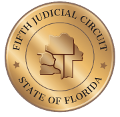Numerous programs have been developed by the Fifth Judicial Circuit to help facilitate the judicial process and serve the citizens and litigants of Citrus, Hernando, Lake, Marion and Sumter Counties.
Programs
Batterers Intervention Program
Pursuant to section 741.325(1), Florida Statutes, when the court orders the respondent to participate in a batterers’ intervention program, the court, or any entity designated by the court, must provide the respondent with a list of batterers’ intervention programs from which the respondent must choose a program in which to participate.
Civil Case Management System
The Florida Supreme Court Issued Administrative Order AOSC20-23 amendment 10 on March 9, 2021 requiring the Chief Judge to implement a differentiated active case management system (DACMS) for most civil cases. For information on Civil Case Management click below.
Fifth Circuit Professionalism Committee
The educational division of the Professionalism Committee promotes professionalism and ethics by developing and hosting a Professionalism Conference every other year. The Professional Practice division promotes professionalism and ethics in the legal profession through local peer panels appointed by the Chief Judge.
Intern/Extern/Volunteer Program
The Fifth Judicial Circuit encourages the community to take advantage of the opportunities available to enhance their knowledge and careers.
Process Server Program
The Chief Judge of the Fifth Judicial Circuit has implemented the Certified Civil Process Server Program, in order to efficiently and uniformly ensure proficiency and professionalism in the service of civil process and in keeping with public trust and legal importance of proper service of process.
Problem Solving Courts
Recognizing the need for an alternative to prosecution, incarceration or family dependency issues, for persons with behavioral or substance use disorders, the Fifth Circuit has several Problem-Solving Court Programs. Modeled after nationally recognized drug courts as well as other alternative courts, it offers a continuum of treatment alternatives, education, and access to other social service needs.
